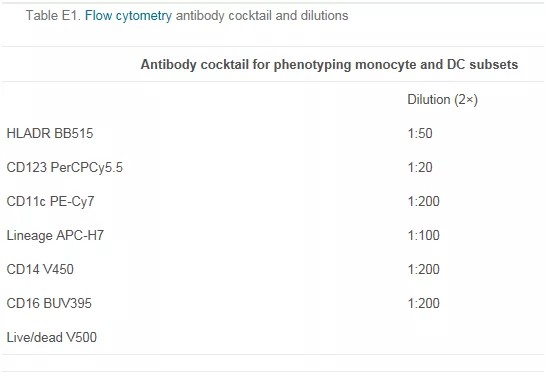JACI:早期先天免疫功能障碍可能是儿童食物过敏
发布日期:2018-11-13
原标题:持续食物过敏的早期先天免疫特征

延伸阅读
JACI
DOI: 10.1016/j.jaci.2017.10.024
Abstract:
Background
Food allergy naturally resolves in a proportion of food-allergic children without intervention; however the underlying mechanisms governing the persistence or resolution of food allergy in childhood are not understood.
Objectives
This study aimed to define the innate immune profiles associated with egg allergy at age 1 year, determine the phenotypic changes that occur with the development of natural tolerance in childhood, and explore the relationship between early life innate immune function and serum vitamin D.
Methods
This study used longitudinally collected PBMC samples from a population-based cohort of challenge-confirmed egg-allergic infants with either persistent or transient egg allergy outcomes in childhood to phenotype and quantify the functional innate immune response associated with clinical phenotypes of egg allergy.
Results
We show that infants with persistent egg allergy exhibit a unique innate immune signature, characterized by increased numbers of circulating monocytes and dendritic cells that produce more inflammatory cytokines both at baseline and following endotoxin exposure when compared with infants with transient egg allergy. Follow-up analysis revealed that this unique innate immune signature continues into childhood in those with persistent egg allergy and that increased serum vitamin D levels correlate with changes in innate immune profiles observed in children who developed natural tolerance to egg.
Conclusions
Early life innate immune dysfunction may represent a key immunological driver and predictor of persistent food allergy in childhood. Serum vitamin D may play an immune-modulatory role in the development of natural tolerance.
First Author:
Melanie R.NeelandPhD
Correspondence:
FRACP, FAAAI, PhD
All Authors:
Melanie R.NeelandPhDaJennifer J.KoplinPhDaThanh D.DangPhDabShyamali C.DharmageMBBS, MSc, MD, PhDacMimi L.TangMBBS, PhD, FRACP, FRCPA, FAAAAIabdSusan L.PrescottMD, PhD, FRACPeRichardSafferyPhDabDavid J.MartinoPhDab∗Katrina J.AllenMBBS, BMedSc, FRACP, FAAAI, PhDabd∗


——来自浙大迪迅
背景:食物过敏的儿童在不干预的情况下自然地解决了一定比例的食物过敏问题;然而,控制儿童食物过敏持续或消除的潜在机制尚不清楚。目的:本研究旨在明确1岁时蛋类过敏相关的先天免疫概况,确定儿童期自然耐受发育过程中出现的表型变化,探讨早期先天免疫功能与血清维生素D的关系。方法:本研究采用纵向的方法,从一组以人群为基础的挑战队列中收集到的PBMC样本,这些样本被证实是鸡蛋过敏的婴儿,他们在儿童时期有持续性或短暂的鸡蛋过敏的结果,并量化了与鸡蛋过敏的临床表型相关的功能性先天免疫反应。结果:我们发现持续的鸡蛋过敏的婴儿表现出独特的先天免疫特征,与短暂的鸡蛋过敏的婴儿相比,其特征是循环的单核细胞和树突状细胞数量增加,在基线和内毒素暴露后产生更多的炎症细胞因子。后续分析显示,这种独特的先天免疫特征在持续对鸡蛋过敏的儿童中持续存在,并 在自然耐受形成过程中发挥免疫调节作用
延伸阅读
JACI
[IF:13.1]
Early life innate immune signatures of persistent food allergyDOI: 10.1016/j.jaci.2017.10.024
Abstract:
Background
Food allergy naturally resolves in a proportion of food-allergic children without intervention; however the underlying mechanisms governing the persistence or resolution of food allergy in childhood are not understood.
Objectives
This study aimed to define the innate immune profiles associated with egg allergy at age 1 year, determine the phenotypic changes that occur with the development of natural tolerance in childhood, and explore the relationship between early life innate immune function and serum vitamin D.
Methods
This study used longitudinally collected PBMC samples from a population-based cohort of challenge-confirmed egg-allergic infants with either persistent or transient egg allergy outcomes in childhood to phenotype and quantify the functional innate immune response associated with clinical phenotypes of egg allergy.
Results
We show that infants with persistent egg allergy exhibit a unique innate immune signature, characterized by increased numbers of circulating monocytes and dendritic cells that produce more inflammatory cytokines both at baseline and following endotoxin exposure when compared with infants with transient egg allergy. Follow-up analysis revealed that this unique innate immune signature continues into childhood in those with persistent egg allergy and that increased serum vitamin D levels correlate with changes in innate immune profiles observed in children who developed natural tolerance to egg.
Conclusions
Early life innate immune dysfunction may represent a key immunological driver and predictor of persistent food allergy in childhood. Serum vitamin D may play an immune-modulatory role in the development of natural tolerance.
First Author:
Melanie R.NeelandPhD
Correspondence:
FRACP, FAAAI, PhD
All Authors:
Melanie R.NeelandPhDaJennifer J.KoplinPhDaThanh D.DangPhDabShyamali C.DharmageMBBS, MSc, MD, PhDacMimi L.TangMBBS, PhD, FRACP, FRCPA, FAAAAIabdSusan L.PrescottMD, PhD, FRACPeRichardSafferyPhDabDavid J.MartinoPhDab∗Katrina J.AllenMBBS, BMedSc, FRACP, FAAAI, PhDabd∗
2018-10-24 Article
创建过敏性疾病的科研、科普知识交流平台,为过敏患者提供专业诊断、治疗、预防的共享平台。

开云电子(中国)官方网站 | 华亿首页(中国)网页版 | 开云网页版 | 天博手机网页(中国)有限公司 | 千亿体育线上平台中国有限公司 | 米兰手机在线登入 | 米乐官方网页版 | 华亿网页版 | 三亿体育首页(中国)网站首页 |
 华亿体育(中国)游戏平台
华亿体育(中国)游戏平台

